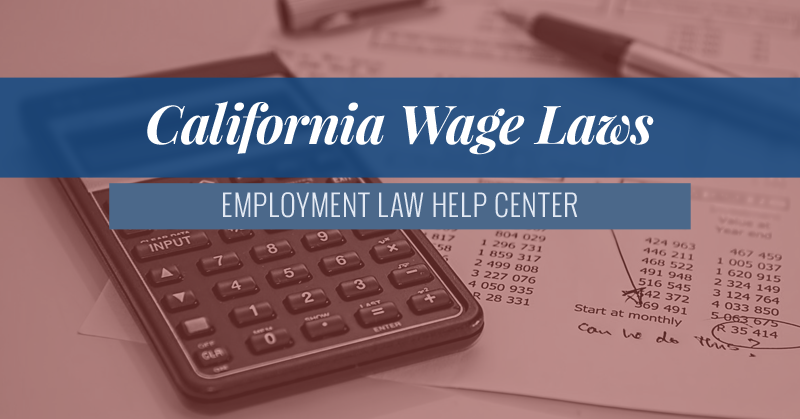California Wage and Hour Laws
Wage and hour laws in California set the basic standards for pay and time worked, and cover such employment issues as minimum wage, meal and rest breaks, tips, what counts as time worked, when employees must be paid, what employers must pay for, and so on. On the federal level, the Fair Labor Standards Act (FLSA) establishes wage and hour requirements for employees in the United States, but California also has its own wage and hour laws, which lay out the rights and duties of employees and employers in the state. If you believe you have been the victim of a wage and hour law violation in California, consult a knowledgeable employment law attorney today to discuss your options for legal recourse. You may have grounds to file a wage and hour claim against your employer, in order to recover the wages you are due.

CA Minimum Wage Requirements
Effective January 1, 2016, the minimum wage requirement in the state of California is $10, which means employers are required to pay employees a minimum $10 for every hour worked, compared to the federal minimum wage requirement of $7.25. In states where employers are subject to more than one minimum wage requirement, they must follow the law that is most generous to the employee, which, in California, is the state law calling for a minimum wage of $10 per hour. While the federal Fair Labor Standards Act and laws in many other states allow employers to pay a lower minimum wage to “tipped” employees who earn tips in addition to their hourly rate of pay, California does not, which means tipped employees in California are entitled to the full minimum wage for every hour worked.

California Meal and Rest Break Requirements
In addition to specific hourly wages, California law entitles covered employees to a meal break of 30 minutes, unpaid, after five hours of work, except in cases where the workday will be completed in six hours, and the employee and employer agree to waive the meal break. Employees who work more than 10 hours in a day are entitled to an additional 30-minute meal break, unless the workday is no more than 12 hours, and the second meal break may be waived only if the first one was not. California law also entitles covered employees to a paid ten-minute rest period for every four hours worked, to be taken in the middle of the work period. This requirement does not apply to employees whose total daily work time is less than three-and-a-half hours. An on-duty, paid meal break may be permitted in cases where the nature of the work means the employee must continue his or her work duties during the break. However, both the employee and the employer must agree to this in writing.
An Experienced California Wage and Hour Lawyer Can Help
State and federal laws regulating the number of hours employees in California are permitted to work, when and how much they must be paid, and how many meal and rest breaks they are entitled to throughout the workday, are important, as they establish and enforce employees’ rights in the workplace. If you have been denied the required minimum pay at work, or if you have been the victim of another wage and hour law violation in California, contact an experienced employment law attorney as soon as possible to discuss the possibility of filing a wage and hour claim against your employer.




